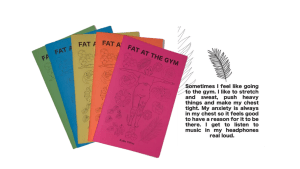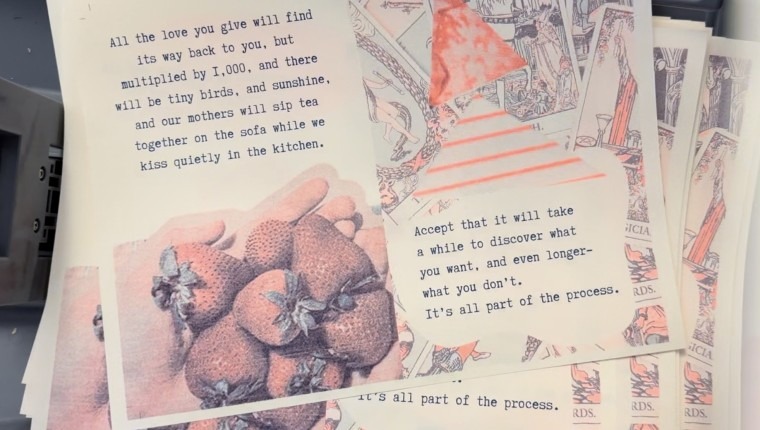I’ve always loved zines from the moment I discovered them, but one of the first zines that *really* left an impact on me was “Fat at the Gym” by Kallie Tiffau. It’s a simple 16 page zine that reframes how people in bigger bodies think about exercise. When I read Kallie’s zine, I had this moment where I realized that an intensely personal experience that I’d had, that I had been too ashamed to talk about with anyone else, was actually a universal one, and I wasn’t alone.

I was first inspired to make a zine “For my younger self” when trying to understand and heal from my own experiences and trauma around body image and acceptance. It was a healing way to address the lessons I’d learned in a way that didn’t further cause shame. It has simple line drawings of bigger bodies in movement, accompanied with lines of text. This month I revisited the project with a new zine- For my younger self: On Love. Valentine’s Day was approaching and I found myself reflecting on love and how much my notions and ideas of love and relationships had shifted in my mid-30’s. The text is written in 2nd person, shifting the reader into the younger version of myself. The images are digital collages and mixed media that was color separated into 2 layers and Riso printed in fluorescent orange and federal blue inks.

For my younger self: On Love made its debut this past Saturday at Tampa Zine Fest and then in Ybor at Indie Flea on Sunday. Usually people will pick up a zine off the table, briefly flip through it, and either put it down or purchase it. On Sunday, one lovely individual stood and read all 20 pages of my zine at the table and when she was done, wiped tears from her eyes, and said “Wow.” She bought the zine.
Even in the digital age of constant connection and curated grids, it’s easy to feel isolated, and alone when life is painful and messy and hard. But zines, as a medium, are inherently a judgement-free zone, a safe space for creative expression and discussion around difficult and serious and painful topics like love and grief and trauma and mental health. They allow us the space to share our stories, those that we may not be able to talk about with friends or family. They connect us, heal us, and reclaim space for us to tell our stories.



